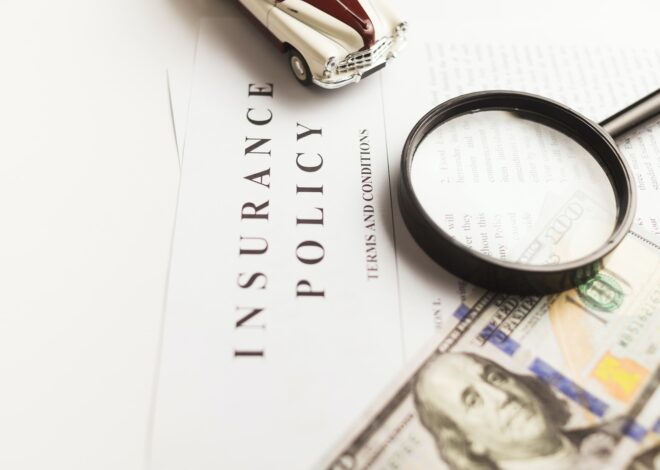
The Essential Guide to Different Types of Insurance Policies
Introduction to Insurance Policies
Insurance policies are contracts between the policyholder and the insurer, designed to provide coverage against certain types of risks. The insurer promises to pay the policyholder a sum of money upon the occurrence of a specific event or peril covered under the policy. In return, the policyholder pays a premium to the insurer.
The Purpose of Insurance
The primary purpose of insurance is to protect against potential losses. It provides financial protection and reduces uncertainties by compensating for the loss caused by a particular event.
Types of Insurance Policies
There are several types of insurance policies available, each designed to cover different types of risks. These include health insurance, life insurance, auto insurance, homeowner’s insurance, and business insurance. Each type of insurance policy has its own terms and conditions, which define the risks covered, the coverage limits, and the premium amount.
The Importance of Understanding Your Policy
Understanding your insurance policy is crucial to ensure that you have the necessary coverage. It helps you understand what is covered, what is not, and how to make a claim when needed. It also helps you make informed decisions about the level of coverage you need and the premium you are willing to pay.
In the following sections, we will delve deeper into different types of insurance policies, their importance, and how they work. This knowledge will help you choose the right insurance policies that best suit your needs and circumstances.
Understanding Health Insurance
Health insurance is a type of insurance coverage that pays for medical, surgical, and sometimes dental expenses incurred by the insured. Health insurance can reimburse the insured for expenses incurred from illness or injury, or pay the care provider directly.
Why Health Insurance is Important
Health insurance is crucial as it can protect you from high, unexpected costs. Without health insurance, a single serious illness or injury could be financially devastating. Moreover, health insurance gives you access to a network of doctors and hospitals, thereby ensuring that you get the medical care you need when you need it.
How Health Insurance Works
When you have health insurance, you pay a premium each month in exchange for coverage. You also have other out-of-pocket costs, including deductibles, copayments, and coinsurance. Some plans cover certain preventive services without charging a deductible, copayment, or coinsurance.
Types of Health Insurance
There are several types of health insurance, including private health insurance, public or government health insurance, and managed care plans. Private health insurance is often provided through employers, but you can also purchase it individually. Public health insurance includes programs like Medicare, Medicaid, and state children’s health insurance programs.
Choosing a Health Insurance Plan
When choosing a health insurance plan, it’s important to consider the cost, coverage, out-of-pocket costs, benefits, doctor choice, and convenience. It’s also important to understand your health care needs and budget before choosing a plan.
In the next section, we will discuss life insurance, another important type of insurance that provides financial security to your loved ones in the event of your death.
The Importance of Life Insurance
Life insurance is a contract between an individual and an insurance company, where the insurer promises to pay a designated beneficiary a sum of money upon the death of the insured person. In return, the policyholder agrees to pay a specified amount, known as a premium, at regular intervals or in lump sums.
Why Life Insurance is Essential
Life insurance is essential as it provides financial security to your loved ones in the event of your death. It can help cover funeral costs, pay off debts, and provide income for your dependents. The payout can also be used to fund future expenses like your children’s education or your spouse’s retirement.
Types of Life Insurance
There are two main types of life insurance: term life insurance and permanent life insurance. Term life insurance covers you for a specific period, while permanent life insurance, such as whole or universal life, provides lifelong coverage.
Term Life Insurance
Term life insurance is designed to provide financial protection for a specific period, such as 10 or 20 years. If you have a term policy and die within the term, your beneficiaries receive the death benefit. Term life insurance often makes sense when you have a need for coverage that will disappear at a specific point in time.
Permanent Life Insurance
Permanent life insurance is designed to provide lifelong coverage. These policies also have a cash value component that grows over time and can be borrowed from or invested for potential growth.
Choosing a Life Insurance Policy
When choosing a life insurance policy, consider your financial situation, age, health, and what you want to achieve with your policy. It’s also important to calculate how much life insurance you need to ensure your loved ones would be adequately provided for if something were to happen to you.
In the next section, we will explore auto insurance, which is crucial for anyone who owns or operates a vehicle.
Navigating Auto Insurance
Auto insurance is a contract between you and the insurance company that protects you against financial loss in the event of an accident or theft. In exchange for your paying a premium, the insurance company agrees to pay your losses as outlined in your policy.
Understanding Auto Insurance Coverage
Auto insurance provides coverage for:
Property
This involves damage to or theft of your car.
Liability
This covers your legal responsibility to others for physical injury or property damage.
Medical
This covers the cost of treating injuries, rehabilitation, and sometimes lost wages and funeral expenses.
Types of Auto Insurance
There are several types of auto insurance, including liability coverage, collision coverage, comprehensive coverage, personal injury protection, and uninsured motorist protection.
Liability Coverage
Liability coverage is legally required in most states and covers the costs associated with injuries and property damage you cause to others in an accident.
Collision Coverage
Collision coverage pays for damage to your vehicle if you hit another vehicle, another vehicle hits you, or your vehicle rolls over.
Comprehensive Coverage
Comprehensive coverage pays for damage to your vehicle that’s not caused by a collision. Examples include damage from fire, theft, vandalism, and falling objects.
Choosing the Right Auto Insurance
When choosing auto insurance, it’s important to understand how much coverage you need, what types of coverage you need, and how much you can afford to pay in premiums and deductibles. It’s also important to compare quotes from different insurance companies to ensure you’re getting the best deal.
In the next section, we will discuss homeowner’s insurance, which is crucial for anyone who owns a home.
Homeowner’s Insurance: Protecting Your Investment
Homeowner’s insurance is a type of property insurance that covers losses and damages to an individual’s house and assets in the home. It provides liability coverage against accidents in the home or on the property.
What Does Homeowner’s Insurance Cover?
Homeowner’s insurance typically covers interior and exterior damage to your home, loss or damage to your personal belongings, and injury that arises while on your property. Each insurance company has different policies, and it’s important to understand what is covered in your specific policy.
Interior Damage
This includes damage caused by incidents such as fire, smoke, theft, vandalism, a leaking roof, or a burst pipe. It’s important to note that if the damage is due to lack of maintenance, it may not be covered.
Exterior Damage
This covers damage to the outside of your home due to events like fire, hail, wind, or other disasters. It can also include damage to detached structures like garages or sheds.
Personal Property
If your personal belongings are stolen or destroyed, your homeowner’s insurance can help you replace them. This can include furniture, clothes, and appliances. It may also cover items outside your home, such as your luggage when you travel.
Liability Protection
This covers you if someone is injured on your property and decides to sue. It can also cover damage you, your family, or your pets cause to other people’s property.
The Importance of Homeowner’s Insurance
Homeowner’s insurance is crucial because it protects one of your most significant investments – your home. It provides financial protection against unexpected disasters and accidents and can give you peace of mind.
Choosing the Right Homeowner’s Insurance
When choosing homeowner’s insurance, consider the cost of rebuilding your home and replacing your belongings. Make sure to understand the policy’s deductibles and coverage limits. It’s also important to review your policy annually to make sure it still meets your needs.
Remember, homeowner’s insurance is an investment in protecting your home and your future. It’s essential to understand your policy and ensure it provides the coverage you need.
Business Insurance: Safeguarding Your Livelihood
Business insurance is a broad term that encompasses various types of coverage designed to protect business owners, their employees, and their assets. It’s an essential tool for safeguarding your livelihood.
Understanding Business Insurance
Business insurance can help cover the costs associated with property damage, theft, liability claims, and even income loss. It’s designed to protect businesses against potential losses and is a crucial part of any business plan.
Property Insurance
Property insurance covers damage to business property and products. This can include buildings, equipment, furniture, inventory, and even digital assets.
Liability Insurance
Liability insurance protects your business if it’s sued for negligence. This can be due to injury or property damage resulting from your products, services, or operations.
Workers’ Compensation Insurance
Workers’ compensation insurance covers medical expenses and a portion of lost wages for employees who become injured or ill on the job.
Business Interruption Insurance
Business interruption insurance compensates for lost income during events that disrupt the normal course of business, such as natural disasters.
The Importance of Business Insurance
Running a business comes with inherent risks: An employee could get injured on the job; a natural disaster could destroy property; or a client could file a lawsuit, to name a few. Business insurance can provide financial support and help protect your livelihood.
Choosing the Right Business Insurance
When choosing business insurance, consider the specific risks associated with your industry and business operations. Work with an experienced insurance agent to tailor a policy that fits your needs. Regularly review and update your coverage to ensure it keeps pace with changes in your business.
In conclusion, business insurance is not just a safeguard—it’s an investment in the stability and future success of your business. Understanding and managing the risks involved in your business can lead to a more robust, resilient business model.








